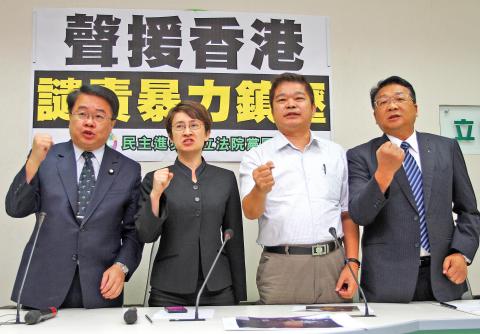Taiwan Solidarity Union (TSU) legislators reacted to violent crackdowns on peaceful demonstrators in Hong Kong by yesterday calling on the Chinese Nationalist Party (KMT) government to suspend talks with China.
TSU caucus whip Lai Zhen-chang (賴振昌) said that China has broken the promises it gave to Tibet in the 17-Point Peace Agreement signed in 1951 and those given to Hong Kong — that it would be allowed autonomy for at least 50 years — prior to China’s takeover of the territory in 1997.
“This shows that any agreements signed with China are meaningless,” he said.

Photo: Chien Jung-fong, Taipei Times
TSU Legislator Chou Ni-an (周倪安) said that as Taiwan and Hong Kong have between 40 and 50 percent dependency on foreign trade, “We should learn the lesson from Hong Kong on what might happen when we are economically overdependent on China.”
“The TSU condemns Hong Kong police for violence against student protesters and we voice our support for Hong Kong’s campaign for democracy,” she added. “We also call on the government to learn from Hong Kong and suspend the signing of any agreements with China.”
Separately, voicing their support for the pro-democracy activists in Hong Kong, Democratic Progressive Party (DPP) legislators yesterday said they would propose a resolution against China’s “one country, two systems” framework.
“The DPP caucus strongly condemns violent crackdowns and any acts against democracy,” DPP caucus whip Hsiao Bi-khim (蕭美琴) told a news conference at the caucus office yesterday. “The caucus will also propose a resolution to show our concerns for the democratic movement in Hong Kong, as well as our objection to the ‘one country, two systems’ scheme.”
DPP Legislator Tsai Huang-liang (蔡煌瑯) said that what is happening in Hong Kong is a lesson for Taiwan.
“I felt saddened last night when I saw a picture on the Internet of a man holding a placard that read: ‘I am Hong Kongese; I would like to urge all Taiwanese to stand on our corpses and think about your future,’” he said. “The crackdown in Hong Kong teaches the lesson that ‘one country, two systems’ is only a big lie. No matter which political party you support, all Taiwanese should show support for Hong Kong’s democracy [movement].”

Taiwanese can file complaints with the Tourism Administration to report travel agencies if their activities caused termination of a person’s citizenship, Mainland Affairs Council Minister Chiu Chui-cheng (邱垂正) said yesterday, after a podcaster highlighted a case in which a person’s citizenship was canceled for receiving a single-use Chinese passport to enter Russia. The council is aware of incidents in which people who signed up through Chinese travel agencies for tours of Russia were told they could obtain Russian visas and fast-track border clearance, Chiu told reporters on the sidelines of an event in Taipei. However, the travel agencies actually applied

Japanese footwear brand Onitsuka Tiger today issued a public apology and said it has suspended an employee amid allegations that the staff member discriminated against a Vietnamese customer at its Taipei 101 store. Posting on the social media platform Threads yesterday, a user said that an employee at the store said that “those shoes are very expensive” when her friend, who is a migrant worker from Vietnam, asked for assistance. The employee then ignored her until she asked again, to which she replied: "We don't have a size 37." The post had amassed nearly 26,000 likes and 916 comments as of this

New measures aimed at making Taiwan more attractive to foreign professionals came into effect this month, the National Development Council said yesterday. Among the changes, international students at Taiwanese universities would be able to work in Taiwan without a work permit in the two years after they graduate, explainer materials provided by the council said. In addition, foreign nationals who graduated from one of the world’s top 200 universities within the past five years can also apply for a two-year open work permit. Previously, those graduates would have needed to apply for a work permit using point-based criteria or have a Taiwanese company

The Shilin District Prosecutors’ Office yesterday indicted two Taiwanese and issued a wanted notice for Pete Liu (劉作虎), founder of Shenzhen-based smartphone manufacturer OnePlus Technology Co (萬普拉斯科技), for allegedly contravening the Act Governing Relations Between the People of the Taiwan Area and the Mainland Area (臺灣地區與大陸地區人民關係條例) by poaching 70 engineers in Taiwan. Liu allegedly traveled to Taiwan at the end of 2014 and met with a Taiwanese man surnamed Lin (林) to discuss establishing a mobile software research and development (R&D) team in Taiwan, prosecutors said. Without approval from the government, Lin, following Liu’s instructions, recruited more than 70 software